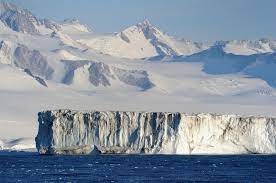
More people were displaced by weather disasters in 2020 than by violent conflicts. Further, the publication indicates the number of internally displaced people in the world reached the highest level in history.

A piece of space debris has hit and damaged part of the International Space Station - namely, the Canadarm2 robotic arm. It's a reminder that the low-Earth orbit's space junk problem is a ticking time bomb.

The massive chunk of ice floating in the Weddell Sea was first spotted on May 13 2021, measuring approximately 170 km long and 25 km wide, it boasts a surface area of 4,300 sq km and is currently the world's largest iceberg.

Carbon pollution from China's coal-intensive economy last year outstripped the carbon pollution of the US, the EU, and other developed nations combined, making up a 27 % of all greenhouse gas emissions worldwide.

Researchers now estimate the clay sheets underneath Mexico City could ultimately compress by 30 % for another 150 years. Not only does this put infrastructure at risk, it also threatens water security for millions of people.

Loss of water on land through ice melting and human-caused factors is changing the movement of the North and South poles.

A new international study suggests that 34% of the Antarctic ice shelves could disappear by the end of the century if the planet warms up by 4°C compared with pre-industrial temperatures.

Direct observations for the first time confirmed the long-standing predictions: radiative forcings of Earth are increasing due to human actions, affecting the planet’s energy balance and ultimately causing climate change.

The concentration of atmospheric CO2 surged past 420 parts per million for the first time in recorded history this past weekend, according to a measurement taken at the Mauna Loa Observatory on Hawaii.

A new study revealed that summer could stick around for six months in the Northern hemisphere by 2100 if efforts to mitigate global warming don’t continue.

U.S. researchers found that, compared to previous generations, members of Generation X and Generation Y showed poorer physical health, higher levels of unhealthy behaviors and more depression and anxiety.

Children exposed to air pollution, such as wildfire smoke and car exhaust, for as little as one day may be doomed to higher rates of heart disease and other ailments in adulthood, according to a new study.

A handful of countries representing just 16 percent of the world's population have snapped up more than half of the available COVID-19 vaccines. If the rich world continues to hoard vaccines, the pandemic will drag on for long.

The Gulf Stream in the north Atlantic ocean, which has a considerable effect on Ireland’s climate, is at its weakest in over a millennium. Human-caused global warming is the most likely cause.

The global appetite for meat is still growing, despite what we know about animal suffering and the environmental cost of eating them. 70% of global agricultural land is used for livestock farming.